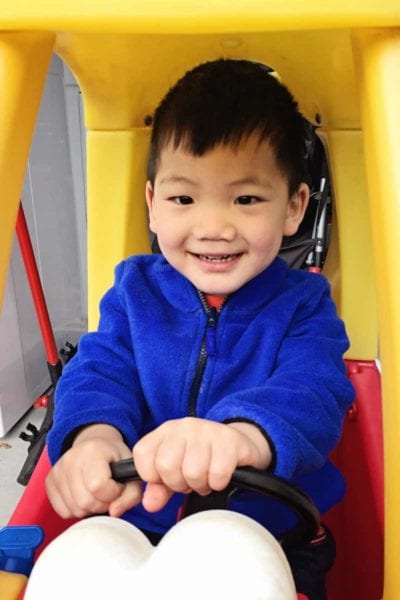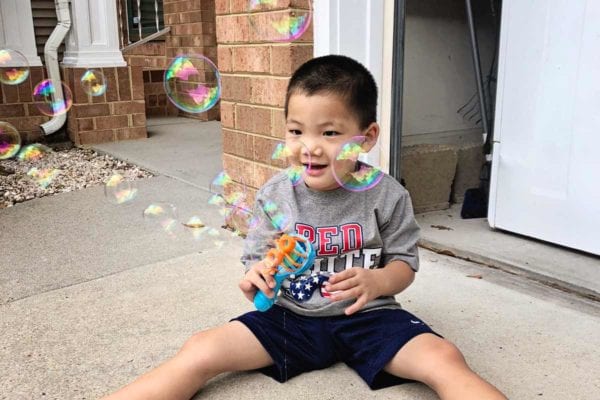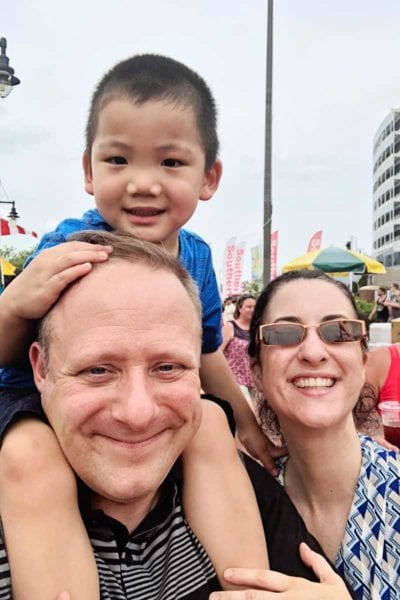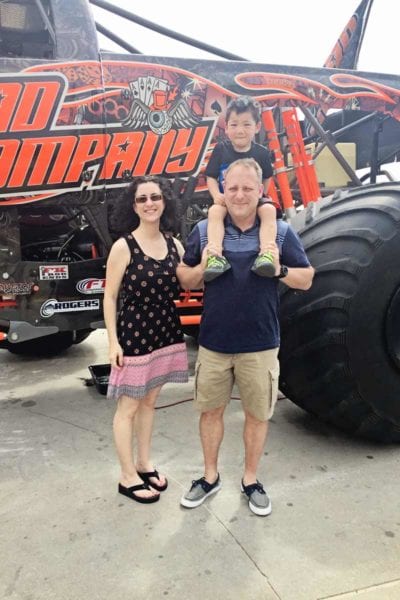Imagine looking at your beautiful, happy, healthy child.
Then imagine the first time that you held him he was two and you were strangers from different continents.
This is adoption.
It is a serious leap of faith into the unknown. It is loving and fiercely protecting someone you have never even met. It is praying daily for the right decisions and right answers to come to you.
And it all starts by saying one word…… Yes.
Yes to love,
yes to family,
yes to the unknown,
and yes to your child.
In our case, a child who lives halfway around the world.
When we first brought our son home from China a little over a year ago, we had read the research on development delays and what kinds of sensory challenges these little ones face from lack of adult interaction when being raised in orphanages. Our son’s file noted a typical developmental delay in speech that many children from tough beginnings face.
So, we were prepared for speech-related intervention if needed. What we were not prepared for were the sensory issues. I can honestly say, I did the required research, read the books and took the online training. All of the educational materials talk about developmental delays and sensory issues, but until I actually saw it with my own two eyes, I had no clue what all of it really looked like in my son’s daily life. Those first six months, the phrase “walk a mile in his shoes” had never rung more true.
Here is a quick background on our son. His file noted a heart defect, bowed legs and speech delay. By the time we met in China, neither the heart defect or bowed legs were present. Further, he was much larger than we had anticipated considering the noted heart defect and the fact we were told he was in an orphanage since shortly after his birth. His muscle tone and overall motor skills were also much better than we had anticipated. His health and size were a blessing.
We never would have imagined that his size would actually become a challenge.
We brought home a two year old healthy boy who did not speak and did not know how to play. He made a lot of noises and always had a smile on face. He seemed to find joy in anything as long as mommy was around and, thankfully, as time went on as long as daddy was around too.
But, playing? He had no clue. I would watch my very happy boy get frustrated trying to build mega blocks or put together his stacking train. How can a healthy, happy little boy have no clue how to play with such kid friendly toys?
Again, I had read all about lack of play skills, but let me tell you, it is one thing to read about it and it is a whole other thing to witness it. I can say seeing a child so badly wanting to get it right and please me by playing with a toy correctly was an extremely heartbreaking thing to watch. I would watch him get so disappointed in himself when he could not figure it out – and then did not understand when I would console him and tell him it was okay.
Considering his lack of play skills, I was not alarmed at how busy he was every day. I just attributed his curiosity to learning his environment. After all, he was frustrated with the toys, so it made sense to me that he would want to help me around the house because he was able to be my assistant in the activity versus the main player.

He also did not know how to interact with children. This was a bit surprising considering he was in a 500 bed facility and was quite mobile. But, again, with so many children, containment (or worse confinement), is key and he was not able to investigate and learn in his environment the way most children do.
Sadly, as with many of these little ones, his social skills were stunted as well. This was a frustrating time not only for our son but for my husband and I. He literally touched everything. I mean every single thing he could reach.
He was so much taller than we anticipated, so we kept putting things we did not want him touching up high. After just a week home, there was no more “up” or “behind” to put things. Our home was small and storage space was very limited. It seemed like the more stuff we put away the more stuff he found to touch and investigate. And forget going out in public! It seemed like no matter how many things he was exposed to he just could not get enough. So, as you can imagine, the park, the museum, play dates and friend visits were beyond challenging.
Again, we expected curiosity, we expected the speech delay, but his behavior seemed overwhelming. Other moms and dads just kept saying he is active and just being a toddler, but to me it seemed like so much more.
I am a stay at home mom. He is our only child. Therefore, I had all my time to spend with him. Since toys were frustrating, we spent a lot of time in my shoe closet. Sounds strange, but he loved trying on all the shoes and we managed to somehow make games out of this activity each day. We also spent a lot of time at the small park near our home. Even though the park was overwhelming at times, we were almost always the only two there and he had the time to learn how the park worked.
After a few months home, we decided to enroll him in a local church pre-k program two mornings a week. We did this not only to help him interact, play and talk, but also to give mommy a break. Luckily, our boy goes with the flow. He needs a routine, but schedules are not a necessity for him. Therefore, this morning program seemed the perfect fit.
Soon I found it much easier to play with him. I found that he would engage with me with toys, versus me approaching him with toys. I found that he wanted to play with me, versus playing alone. After a few months of being in the school and learning to play, we noticed his motor skills and play skills were coming along beautifully… but language, not so much.
With the increased social interaction and improvement in motor skills, we decided we needed more help if we were going to get him talking. We reached out to early intervention and began speech therapy. Once the therapist could no longer see him in the home as he was turning three, she offered to observe him in class for a few days so she could see how to set his goals once we started seeing her in the office.
An important thing to note here, many of these kiddos from tough places need to form trust in order to benefit from a caregiver relationship. This not only includes parents, but babysitters, teachers and medical professionals as well. Keeping our speech therapist was by far one of the biggest blessings we have had in this journey. Her support has truly made all the difference in our child’s development. Therefore, I urge parents to fight for continuity of care when going from early intervention in the home to private services in the office. It does make a world of difference and shows your child how important trust and consistency is.
Our speech therapist was able to observe our son two different days in school. On top of that, his teacher’s daughter and my sister, both special education teachers, were also able to observe him. Having these three observations changed the entire course of our treatment plan for our son.
I kept saying to everyone, “He touches everything.” Most people did not get why that was so alarming. After all, he was a toddler, and toddlers touch. Thank goodness, our son’s teacher, our speech therapist and the two special education teachers all agreed it was more than just toddler curiosity. I was so grateful to have others really see him and help point me in the right direction.
All three of them agreed he had attention issues stemming from his sensory seeking. It appeared he had a Sensory Processing Disorder.
Now, when doing all the research, we read up on sensory issues. There is a lot to read, and what struck me most was the food, clothes, noise and bright light issues many of these little ones have. Being in facilities and not exposed to natural light, outdoor sights and sounds, fed a limited diet, and wearing similar clothing all the time can throw these little ones for a loop once they come into families. Therefore, the busy nature of our son and the happy curiosity he had did not seem too far out of typical toddler behavior.

That is, until we were in public or he was in school. His “spirited” nature seemed to increase tenfold when he was in new places or sensory stimulating circumstances. He never melted down or got angry, just busy. Very, very, very busy. I like to describe it as disorganized. The book, No Longer a Secret was recommended by another adoptive mama, and this book describes our son’s disorganization perfectly. I would highly recommend it to any family dealing with sensory issues.
With the help of our speech therapist and our pediatrician, we were able to get a referral for occupational therapy. The therapist was wonderful. She was happy to do co-visits with the speech therapist to help get his attention span to increase and help me figure out ways to get his energy out in productive ways out in the world. Simple things like give him a heavy bag to carry, have him wear a weighted backpack, and get a mini trampoline for home, were so incredibly helpful. I would say the most helpful thing we gained was learning about heavy work. Give him a job. If the table is dirty, give him a wet cloth to wipe it down with, if I am folding laundry ask him to help carry the clothes. She offered simple things that made our lives and his life much easier and much more organized.
Another benefit with OT is being able to try things out to see if they work before purchasing items that may or may not help. For example, weighted vests are commonly used for sensory seekers as a way to calm them and increase sitting and attention. For our son, he was more interested in how the vest itself worked, making it a moot point. However, I already had a backpack so we loaded it up and started using it in therapy. Thankfully, it helped and we added into his daily routine in school. In fact, I leave the backpack right at school so he knows to go to his cubby and get it.
Our OT also pointed out how much his legs move when he sits. We tried a wiggle disc without too much success, but a wiggle stool has helped in school and a yoga ball has helped at home. Again, simple solutions to a challenging situation.
Here we are eight months after starting speech therapy and four months after starting occupational therapy and I can say our son speaks and will now sit. While he is far from caught up to his peers, he makes incredible strides every day. I cannot even count the number of words he knows and can now say.
Going into busy environments is still hit or miss. However, giving him a job and having the weighted backpack on hand have greatly reduced his disorganization; the increase in language has certainly helped him communicate his needs much easier.
Another thing I have found that helps us considerably in public is using a wagon. He is much too big for a stroller, but he still gets tired or wants to have a snack when we are out. Adding in the wagon has been a big help. When he is not sitting in it, he likes to pull it and that keeps him closer to us when in busy places. We bought it used and it was the best purchase I made this summer. He successfully went to the zoo and state fair with his wagon and it reduced mama’s stress by a considerable amount.

I cannot stress enough how the adoption community has helped us in this journey. Hearing similar stories and getting advice from other adoptive mamas who have walked this path has been an incredible support and blessing.
Choosing caregivers, teachers and medical professionals who “get it” is crucial as well. Our family and close friends have been flexible in making plans and making accommodations for our son, which makes holidays and events so much more enjoyable.
Our son’s school adores him and wants him to succeed. The support we receive as parents there has been such a blessing. They truly want what is best for their families and it shows in the work they do every day. They have worked with us all along the way to ensure we are helping him bridge the gap and are helping us set him up for future educational success.
Our SPT and OT have been nothing short of amazing. They love what they do and want the best for their clients. I have no doubt our son’s amazing strides would not have been possible without them.
I say to anyone who is dealing with any of the delays commonly associated with adoption and foster care to reach out for help when it seems too much. As parents, we want to be able to do it all. Sometimes we just cannot and it is okay to reach out. I know that reaching out is what has made the difference in my boy’s development.
He is a shining star for anyone who has crossed paths with him and we are so grateful for love and support he gets every day.

Delays are challenging for any parent. Delays for adoptive parents are even more challenging with lack of medical and family history. Being your child’s advocate and fighting for what they need can be draining. Just know there are other mamas out there walking this path with you and cheering you on.
– guest post by Dana

























Leave a Reply